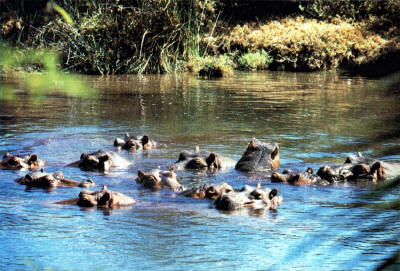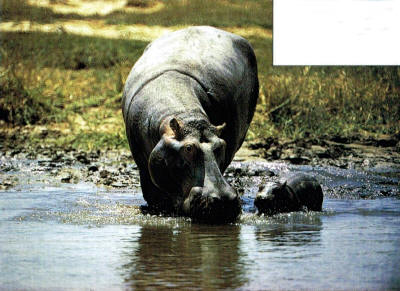|

As the only
refuge from the scorching sun,
a river offers the hippo a cooling, tranquil rest.
BREEDING
When a female is ready to mate, she will seek out an
adult male. After approximately 34 weeks, the female leaves the
group and gives birth to a single young. Sometimes the young is born
underwater, and it must surface quickly to take its first breath.
Within 5 minutes of birth, the
young hippo can swim and walk. The mother suckles the young hippo
for only 8 months, although it remains with her for several years.
A female is often seen with
several young following her; the youngest walking closest and the
oldest following at the end.


A mother
guards her calf while young males
indulge in a bout of wrestling.
|
HABITS
The hippopotamus usually lives in groups of 15-20
animals, although the groups can be much larger. The hub of the
group is the band of females and their young. This group lives on
territory patrolled by a dominant, solitary male who is at least 20
years old.
A dominant male is able to defend his territory for as long as 10 years,
until a fierce fight with a younger rival male may end his dominance
−and even result in his death. Young males who do not have their own
groups form small bachelor groups. If a male successfully
challenges a rival, he leaves the bachelor group and becomes the
dominant male in his new territory.
FOOD & FEEDING
The
hippopotamus spends up to 18 hours a day in the water keeping cool.
It feeds during the hours following sunset. With the exception of
mothers and their offspring, the animals leave the water singly to make
their way along well-worn paths to their feeding grounds.
If the
hippo finds a wallow of muddy water, it may remain immersed in it for much
of the day. It may feed in the new area rather
than returning to its usual feeding ground.
For
such a large animal, the hippo eats surprisingly little −about 90 pounds a
night. This is partly because it stays submerged in water most of the
time, which uses up little energy.
DID YOU KNOW?
●
Because it loses water through its skin much faster than other mammals, a
hippo can not survive for long on dry land in hot weather.
●
A hippo can stay underwater for up to 5 minutes and often walks along the
bottom of lakes.
●
Turtles, birds, and even young crocodiles often bask in the sun on the
backs of hippos.
●
The term "sweating blood" comes from the hippo's function of secreting a
pink fluid from glands beneath its skin.
|


![]()
![]()